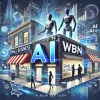
By Elke Porter | WBN Ai | November 1, 2025
Subscription to WBN and being a Writer is FREE!
We're witnessing an unprecedented collision between traditional academia and artificial intelligence, with students, educators, and institutions scrambling to establish ground rules while the technology races ahead. The viral TikTok videos of professors confronting AI-using students reveal more than generational friction—they expose a fundamental crisis in how we prepare young people for an AI-integrated world.
The Current Disconnect
Educators who've spent decades honing their craft around traditional learning methods now face students wielding AI tools that challenge everything from note-taking to research methodology. What professors view as plagiarism, students see as efficiency. What teachers call cheating, the workplace increasingly calls proficiency. This disconnect isn't just uncomfortable—it's potentially leaving students unprepared for careers where AI literacy is becoming as fundamental as typing skills.
Teaching Ethics in Real-Time
The challenge for parents, teachers, and administrators is teaching ethical AI use when society itself hasn't finished writing the rulebook. We must help children understand that just because AI can complete an assignment doesn't mean it should. The focus should shift from "did you use AI?" to "how did you use AI, and what did you learn?"
Start with transparency. Teach children to disclose AI assistance, understanding that honesty about tool usage builds trust and demonstrates integrity. Help them distinguish between AI as a brainstorming partner versus a replacement for critical thinking. A student who uses AI to understand complex concepts, then synthesizes that knowledge in their own voice, is developing crucial skills. One who simply copies AI outputs learns nothing.
Preparing for the Real World
Here's the uncomfortable truth: the workplace actively encourages AI adoption. Companies expect employees to leverage these tools for productivity, creativity, and problem-solving. Students graduating without AI fluency face genuine career disadvantages. The solution isn't banning AI in schools—it's teaching responsible use alongside traditional skills.
Educational institutions must rapidly develop frameworks that acknowledge this reality. This means creating assignments that require uniquely human skills: original analysis, creative synthesis, ethical reasoning, and collaborative problem-solving that AI cannot replicate. It means teaching students to be AI-literate critics, not passive consumers.
The Adaptation Challenge
School boards and universities face enormous pressure to adapt curricula, assessment methods, and academic integrity policies—often with limited resources and consensus. Private schools may pivot faster, but public institutions serve the majority. The speed of adaptation will vary dramatically, creating educational inequities where some students gain AI literacy while others fall behind.
The path forward requires humility from all parties: educators acknowledging that teaching methods must evolve, students respecting the learning process beyond shortcuts, and institutions prioritizing ethical frameworks over knee-jerk bans. We're not just teaching children to use AI—we're teaching them to shape a future where technology amplifies rather than replaces human potential.
Contact Elke Porter at:
Westcoast German Media
LinkedIn: Elke Porter or
WhatsApp: +1 604 828 8788.
Public Relations. Communications. Education
TAGS: #AI in Education #Ed Tech #Teaching AI Ethics #Future Of Learning #Digital Literacy #AI for Students #WBN Ai #Elke Porter


